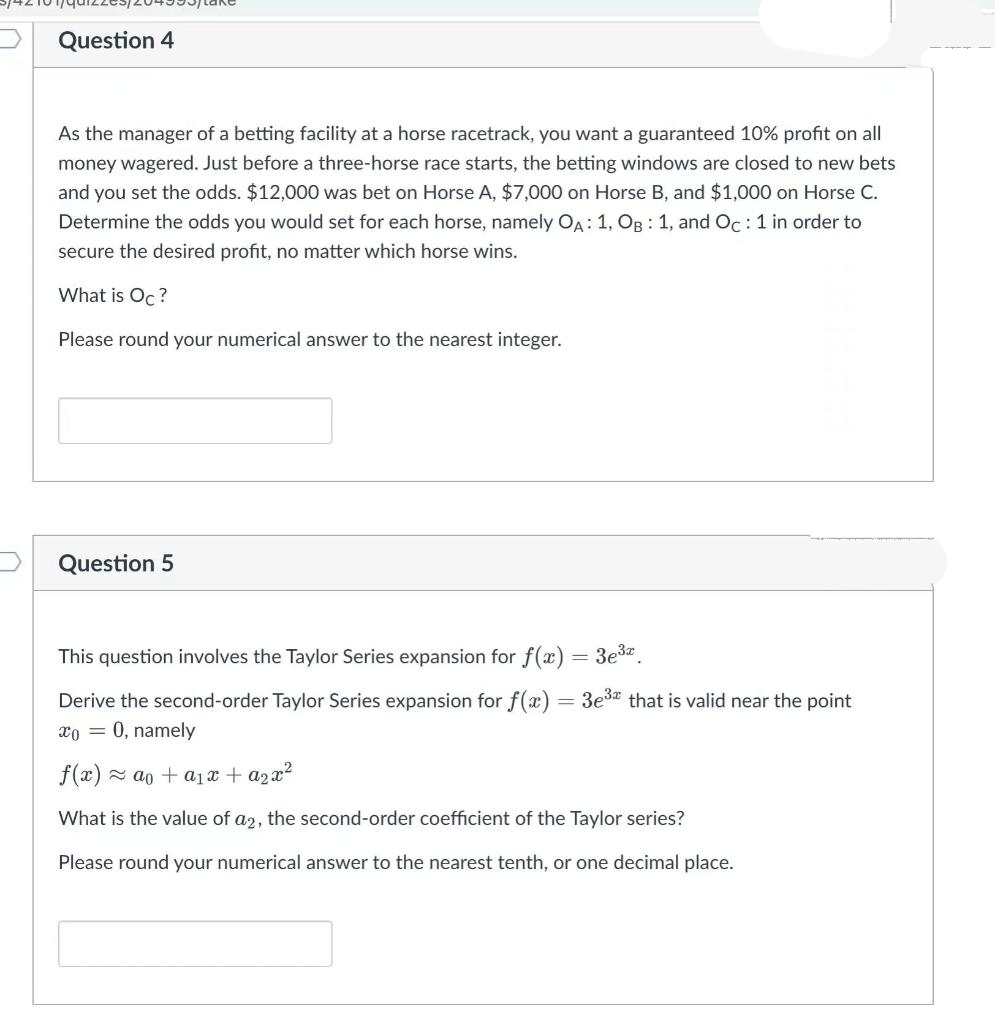This question involves the Taylor Series expansion for f(a) = 3e3. Derive the second-order Taylor Series expansion for f(x) = 3e3 that is valid near the point %3D xo = 0, namely f(x) - ao + a1x + a2x? What is the value of a2, the second-order coefficient of the Taylor series? Please round your numerical answer to the nearest tenth, or one decimal place.
This question involves the Taylor Series expansion for f(a) = 3e3. Derive the second-order Taylor Series expansion for f(x) = 3e3 that is valid near the point %3D xo = 0, namely f(x) - ao + a1x + a2x? What is the value of a2, the second-order coefficient of the Taylor series? Please round your numerical answer to the nearest tenth, or one decimal place.
Calculus: Early Transcendentals
8th Edition
ISBN:9781285741550
Author:James Stewart
Publisher:James Stewart
Chapter1: Functions And Models
Section: Chapter Questions
Problem 1RCC: (a) What is a function? What are its domain and range? (b) What is the graph of a function? (c) How...
Related questions
Question

Transcribed Image Text:Question 4
As the manager of a betting facility at a horse racetrack, you want a guaranteed 10% profit on all
money wagered. Just before a three-horse race starts, the betting windows are closed to new bets
and you set the odds. $12,000 was bet on Horse A, $7,000 on Horse B, and $1,000 on Horse C.
Determine the odds you would set for each horse, namely OA: 1, OR : 1, and Oc:1 in order to
secure the desired profit, no matter which horse wins.
What is Oc?
Please round your numerical answer to the nearest integer.
Question 5
This question involves the Taylor Series expansion for f(x)
3e3z.
Derive the second-order Taylor Series expansion for f(x) = 3e3 that is valid near the point
xo = 0, namely
f(x) = ao + a1x + a2x?
What is the value of a2, the second-order coefficient of the Taylor series?
Please round your numerical answer to the nearest tenth, or one decimal place.
Expert Solution
This question has been solved!
Explore an expertly crafted, step-by-step solution for a thorough understanding of key concepts.
This is a popular solution!
Trending now
This is a popular solution!
Step by step
Solved in 2 steps with 1 images

Recommended textbooks for you

Calculus: Early Transcendentals
Calculus
ISBN:
9781285741550
Author:
James Stewart
Publisher:
Cengage Learning

Thomas' Calculus (14th Edition)
Calculus
ISBN:
9780134438986
Author:
Joel R. Hass, Christopher E. Heil, Maurice D. Weir
Publisher:
PEARSON

Calculus: Early Transcendentals (3rd Edition)
Calculus
ISBN:
9780134763644
Author:
William L. Briggs, Lyle Cochran, Bernard Gillett, Eric Schulz
Publisher:
PEARSON

Calculus: Early Transcendentals
Calculus
ISBN:
9781285741550
Author:
James Stewart
Publisher:
Cengage Learning

Thomas' Calculus (14th Edition)
Calculus
ISBN:
9780134438986
Author:
Joel R. Hass, Christopher E. Heil, Maurice D. Weir
Publisher:
PEARSON

Calculus: Early Transcendentals (3rd Edition)
Calculus
ISBN:
9780134763644
Author:
William L. Briggs, Lyle Cochran, Bernard Gillett, Eric Schulz
Publisher:
PEARSON

Calculus: Early Transcendentals
Calculus
ISBN:
9781319050740
Author:
Jon Rogawski, Colin Adams, Robert Franzosa
Publisher:
W. H. Freeman


Calculus: Early Transcendental Functions
Calculus
ISBN:
9781337552516
Author:
Ron Larson, Bruce H. Edwards
Publisher:
Cengage Learning